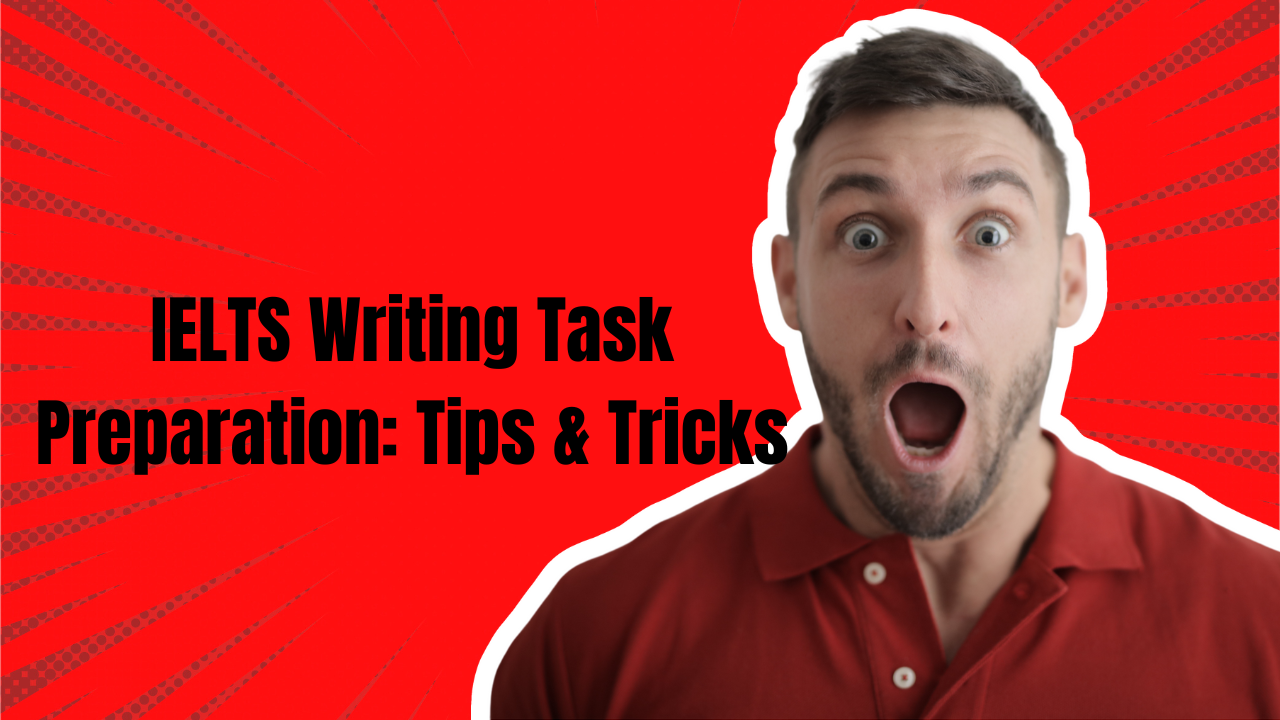The IELTS writing test is important if you plan to study or work in an English-speaking country. The test consists of two tasks: Task 1 and Task 2. In IELTS writing Task 1, you are given a graph, chart, table, or diagram and asked to describe, summarize, or explain the information in your own words.
In IELTS writing Task 2, you are asked to write an essay responding to a question or topic.
Here are some IELTS writing test tips to help you succeed in the IELTS writing test:
Understand the IELTS Writing task requirements
Before starting your IELTS writing tasks, ensure you understand the requirements. Each IELTS task has specific guidelines, such as word count, required response type, and formatting.
For example, in Task 1, you need to write at least 150 words and should focus on describing and summarizing a bar chart. In Task 2, you need to write at least 250 words and should present a well-supported argument in the form of an essay.
Check out this video for tips on How to Describe a Bar Chart in IELTS Writing Task 1.
You will receive a lower score if you fail to meet the minimum word count of 150 words in Task 1 or 250 words in Task 2.
Plan your response.
You can make the most of your limited time by planning your response before you start writing. Take a few minutes to brainstorm ideas, create an outline, and organize your thoughts. This will help you stay focused and ensure that your writing is logical and coherent.
For example, in Task 2, you can start by brainstorming examples and evidence that support your argument. Then, create an outline with an introduction, body paragraphs, and a conclusion. In the introduction, introduce the topic and state your thesis. In the body paragraphs, present your examples and evidence. In conclusion, summarize your main points and restate your thesis.
Use a variety of sentence structures.
Using various sentence structures is essential for success in the IELTS writing task. It demonstrates proficiency in the English language and enables you to communicate your ideas effectively. A diverse use of sentence structures makes your writing more coherent and engaging, creating a sense of flow. It also shows that you can use a range of language structures, which is important for a high score.
In addition, varying sentence structures add interest and variety to your writing. It avoids repetition and monotony, keeping the reader’s attention. It also makes your writing more dynamic and expressive, as different structures can convey different emotions or emphasis. Using various sentence structures is crucial for achieving a high score on the IELTS writing task.
Use a wide range of vocabulary.
A diverse vocabulary is crucial for doing well on the IELTS writing task. It showcases a firm grasp of English and enables you to communicate your ideas effectively. A varied vocabulary ensures you use the most suitable and precise words, making your writing more coherent and compelling. It also shows that you can use a variety of language structures, which is crucial for getting a high score.
Furthermore, using a wide range of vocabulary improves the overall quality and sophistication of your writing. It helps you avoid repetition and use more sophisticated synonyms, making your writing more exciting and engaging. It also avoids using overly simple or common words, which can make your writing uninteresting or repetitive. Overall, having a diverse vocabulary is essential for achieving a high score on the IELTS writing task.
Use linking words and phrases in Your IELTS Writing Task.
Linking words and phrases is crucial for creating coherence and cohesion in your IELTS writing task. It shows the relationships between your ideas and signals to the examiner how they are connected. It also helps make your IELTS writing more fluent and natural. This is particularly important in the IELTS exam as it makes your writing more coherent and easier to understand.
Overall, linking words and phrases is essential for achieving a high score on the IELTS writing task.
Here is a video showing you how to Connecting Sentences in IELTS Writing
Use proper grammar and spelling.
Proper grammar and spelling are essential for clear and effective communication in the IELTS writing task because they help to ensure that your ideas are conveyed accurately and clearly. This means using the correct verb tense, ensuring that the subject and verb in a sentence agree, and using proper punctuation. It is also essential to spell words correctly and use the appropriate vocabulary for the context in which you are writing.
Proper grammar and spelling are essential in the IELTS writing task because it helps to demonstrate your command of the English language and your ability to communicate effectively. It is also important for the overall coherence and clarity of your writing, as grammar and spelling errors can confuse the reader and disrupt the flow of your ideas.
Therefore, paying attention to proper grammar and spelling in your IELTS writing is essential to ensure that your ideas are conveyed effectively and that you can achieve a high score on the exam.
Use transitional words and phrases in IELTS Writing Task.
Transitional words and phrases are essential in the IELTS writing task because they help to create coherence and cohesion in your writing. Coherence refers to the logical flow and organization of your ideas, while cohesion refers to how your ideas are connected and linked. Transitional words and phrases help to show the relationships between your ideas and to signal to the reader how the ideas in your essay are connected.
Some common transitional words and phrases include:
- Therefore
- As a result
- Consequently
- Hence
- Thus
Using transitional words and phrases also helps to make your writing more fluent and natural-sounding. It allows you to transition between ideas smoothly and to create a sense of flow and continuity in your writing. This is particularly important in the IELTS exam, as it helps to make your writing more coherent and easier to understand for the reader.
Transitional words and phrases are essential for creating coherence and cohesion in your IELTS writing task and for making your writing more fluent and natural-sounding. They are essential skills to master to achieve a high score in the IELTS writing task.
Conclusion
Following these tips and advice can improve your chances of success in the IELTS writing test. Remember to plan your response, use a variety of sentence structures, use a wide range of vocabulary, use linking words and phrases, use proper grammar and spelling, use a formal writing style, use transitional words and phrases, use specific and concrete examples, and edit and proofread your work. By putting in the effort to prepare for the test and writing a well-organized and well-written response, you can demonstrate your English language proficiency and achieve the score you need to reach your goals.
For complete IELTS tips & tricks on writing, speaking, listening, and reading, register for this course.


